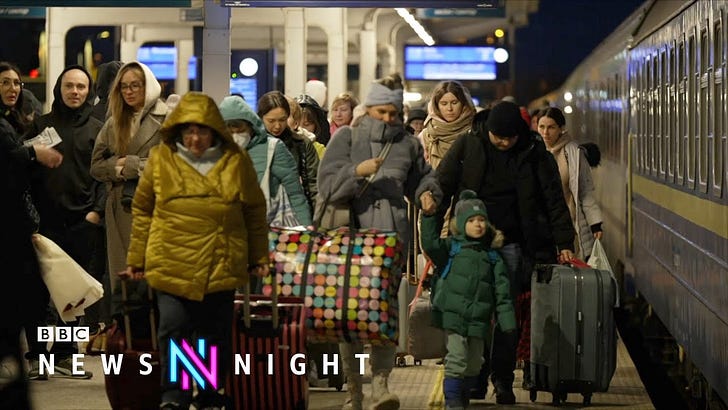I'm surprised and puzzled by the seeming non-reaction of far-right groups in Europe and the US to the Ukrainian refugees.
Ana Kasparian recently mentioned the Ukrainian refugees in the US in a May 17 TYT broadcast on the general mess of Biden’s immigration/refugee policies. The Department of Homeland Security earlier this year estimated the number at 271,000.1
On the practical side - not that xenophobes care about that! - the fact that both the US and the EU can quickly absorb Ukrainian refugees without Biblical rending of clothes and gnashing of teeth is practical proof that non-hysterical reactions by governments and politicians to refugees can actually work well.
Not to indulge in "Russiagate" thinking, but the Russian government surprisingly seems to not be agitating the UKR refugee issues as hard as one might have expected. So far-right groups taking their lead from Putin may be biding their time. Far-right parties in Europe currently seem to be mainly replaying their favorite slogans of previous years about scary, dark-skinned people and Muslims.
The EU currently has something like 5 million or more Ukrainian refugees. In 2015-16 when around 1.2 million refugees from wars came into the EU, it was called then and is remembered now as a terrible "refugee crisis." Seeing how well (so far) the EU has been able to handle the Ukrainian refugee situation, I've started to think the only real "crisis" in 2015-16 was that politicians and demagogues pretended to lose their minds over the situation.
Poland’s situation may be a key factor in this situation. Poland currently has the largest number of Ukrainian refugees of any EU country. Poland is especially concerned to shore up its security situation against Russia and is itself building up its armed forces for that purpose.2
The UN Refugee Agency currently reports 1.6 million officially recorded in Poland as Ukrainian refugees.3 But the figures on border crossings suggested that the number could easily be 2 million. A year-end 2022 estimate from the same Agency from May 2023 a “projected refugee population” of 2.6 million in Poland as of December 2022.4
Poland in the 2015-16 “crisis” was outspoken in its hostility to receiving refugees, most of whom were arriving in the EU through Greece, Italy, and Hungary. In 2021, Belarus sent several thousand asylum-seekers from the Middle East across the border into Poland, in what looks in retrospect like a test of EU reaction to new refugee flows in the lead-up to the Russian invasion of Ukraine. The Ukrainian refugee movements has produced by far the largest number of refugees in Europe since the immediate aftermath of the Second World War.
There is no guarantee that this favorable reception of Ukrainian refugees will endure. One reason may be that the general publics in the EU nations may have the impression that somehow these refugees are temporary. But even if the war should end now, many of them will not be going back to Ukraine, which has suffered devastating destruction of economic infrastructure already. And it’s not as though Russia hasn’t been at least trying out some initial propaganda against these refugees:
European leaders have largely kept a low profile on the issue. Yet while they implement refugee-friendly policies, they are overlooking the need to maintain public support for choices over Ukrainians’ access to labour markets and social benefits. This vacuum risks being filled by disinformation about refugees supposedly receiving preferential treatment to the detriment of local residents.
Indeed, Russia’s disinformation machine is already hard at work pouring such falsehoods into social media. The Kremlin has a clear interest in dividing European societies and turning public opinion not only against those fleeing the war but against supporting Ukraine altogether. [my emphasis]5
This is a brief BBC report from this year on Ukrainian refugees in Poland6:
Poland engaged in illegal “pushbacks” of those refugees, in defiance of both the Geneva Refugee Convention and EU law. Bizarrely (and cruelly), even after receiving and accepting massive number of Ukrainian refugees since February of 2022, Poland still continues its illegal pushbacks on the border to Belarus. While the EU has imposed sanctions against Poland for its lack of judicial independence that puts them in violation of the EU’s rule-of-law standards.
The big thing missing politically in both the US and the EU is effective direct countering of the xenophobic rhetoric. Biden's new announced border policy in the US also looks to me to be blatantly in violation of the Geneva Refugee Convention. But the enthusiastic support by the US and most of the EU countries for Ukraine in the war has presumably blunted some xenophobic reactions so far.
European governments need to take control of the narrative on Ukrainian refugees before the messages of populist parties and Russian disinformation campaigns go mainstream. If, for instance, the head of Germany’s main centre-right party, Friedrich Merz, is able to accuse Ukrainian refugees of ‘welfare tourism’ (a comment for which he later apologised), it hurts not only refugees but also undermines EU policy and hands a win to Russia’s trolls and propagandists. …
European leaders should not allow the Kremlin to instrumentalise refugees. Instead, they need to take responsibility for shaping the narrative, and soon.7
Ainsley, Julia (2023): U.S. has admitted 271,000 Ukrainian refugees since Russian invasion, far above Biden’s goal of 100,000. NBC News 02/24/2023. <https://www.nbcnews.com/politics/immigration/us-admits-271000-ukrainian-refugees-russia-invasion-biden-rcna72177> (Accessed: 2023-19-05).
Mordowanec, Nick (2023): This NATO Ally is Building Strongest Army After Ukraine: Military Analyst. Newsweek 03/24/2023. <https://www.newsweek.com/this-nato-ally-building-strongest-army-after-ukraine-military-analyst-1790234> (Accessed: 2023-19-05).
Operational Data Portal: Ukrainian Refugee Situation. UN Refugee Agency n/d. <https://data2.unhcr.org/en/situations/ukraine> (Accessed: 2023-19-05).
Operational Data Portal: Poland: Refugee Response Plan 2022. UN Refugee Agency 05/15/2023 (?). <https://data.unhcr.org/en/dataviz/225?sv=54&geo=10781> (Accessed: 2023-19-05).
Hosa, Joanna & Valodskaitė, Gabrielė (2023): Ukraine: the risk of ‘refugee fatigue’. Social Europe 01/10/2023. <https://www.socialeurope.eu/ukraine-the-risk-of-refugee-fatigue> (Accessed: 2023-19-05).
How Ukrainian refugees in Poland are coping a year on from the war - BBC Newsnight. BBC News YouTube channel 02/27/2023.
Ibid.


